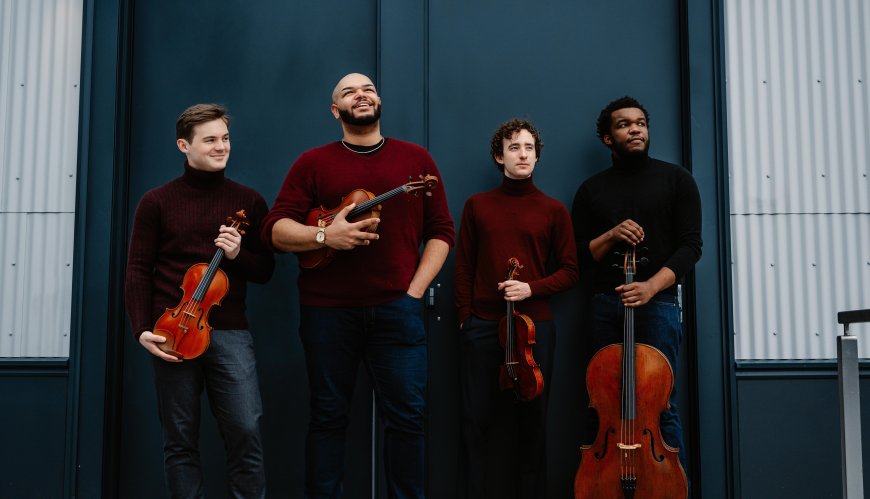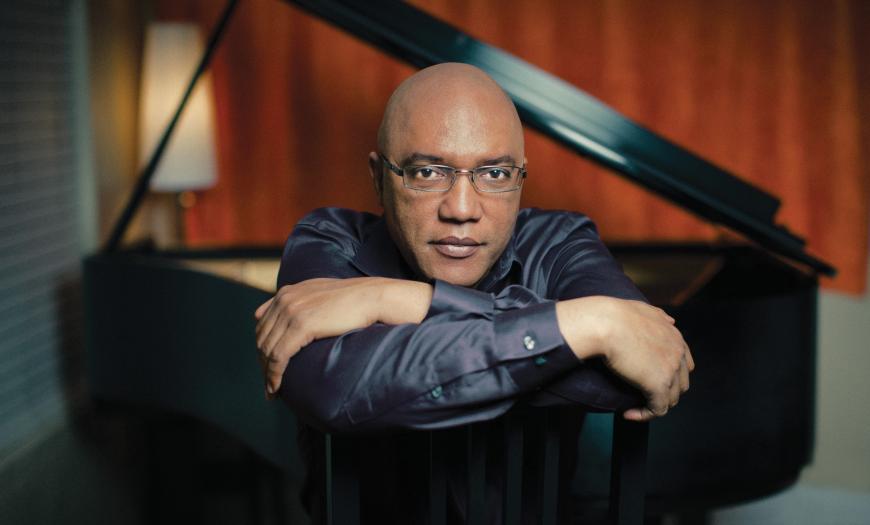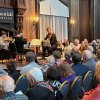
In just five years of playing together, the Isidore String Quartet has withstood two major life changes.
First, there was the pandemic — a trying time for any ensemble, but crushing for this one, which, having formed at Juilliard in 2019, had only just started working together. For a long while, nothing happened. Then, just as restrictions lifted, the group won the Banff International String Competition after not even expecting to make the finals. Overnight, the Isidore Quartet went from playing a few performances a year to touring an 80-concert season.
The ensemble is on firm footing, judging from its San Francisco Performances debut on Wednesday, April 16, at Herbst Theatre.
On display in the evening’s opening work, Mozart’s String Quartet No. 19 in C Major, K. 465 (“Dissonance”), was a silvery classical sound over a faultless technical foundation. Together, the four Isidore players — violinists Adrian Steele and Phoenix Avalon, violist Devin Moore, and cellist Joshua McClendon — form a round blend. They’re sparing with showmanship and exacting with vibrato, though liberal with rubato. Even in the most predictable of classical phrases, they seem to take nothing for granted.
If the phrasing in Mozart’s Andante occasionally felt overinvolved, the movement did have its highlights in magnificently wrought suspensions and impossibly intimate cadences. The finale, in the spirit of a hornpipe, brought rousing runs from Avalon, here playing first violin.
Best of all was the way that the ensemble, with deliciously slow and straight tones, drew out the impassive introduction of the first movement — Mozart’s only slow introduction in a quartet, and one whose dissonances continued to shock decades later. We now can trace this opaque chromaticism to the Baroque music the composer was increasingly hearing after moving to Vienna, but at the time, listeners didn’t know what to make of these harmonies.
Beethoven’s late quartets can also seem to exist in a world of their own. By this same token, it should be no surprise that the composer’s String Quartet No. 12 in E-flat Major, Op. 127, owes a debt to the great contrapuntists of centuries past. From the first movement’s slow cantus firmus (a fixed melody at the base of a multivoiced composition) through the finale’s country dance, the Isidore’s performance was mostly gracious and gentle. Even the Scherzando — with its Handel-like hopping rhythms and oratorio-style interjections — was sweet.
The profound Adagio at the heart of the piece was exquisite and, in a way, ascetic. The most obscure variations sounded so pretty that there was little sense of resolution when at last the theme came back around.

The middle of Wednesday’s program brought the drama in a work by Billy Childs, a Grammy Award-winning jazz artist whose classical compositions are rising rapidly.
Childs’s String Quartet No. 3 (“Unrequited”) draws on an infamous episode in the life of Czech composer Leos Janáček, who wrote hundreds of love letters to a married woman nearly 40 years his junior, also documenting these feelings in his 1928 string quartet “Intimate Letters.” If Childs’s 2015 work is a degree removed, his version of the story was nonetheless gripping in this taut and vivid performance by the Isidore. You scarcely needed the program notes to follow the progression from romance to something darker.
Tentative two-chord gestures bloom into lush lines; fluttering tremolo animates feverish nights. Before long, the music turns erratic, agitated. There’s a final outburst, then silence — first tense, then resigned. The opening chords return in a stultifying loop, as if nodding in agreement that nothing further will come of this love.
But the future is bright for Childs and the Isidore members, who performed the composer’s String Quartet No. 2 (“Awakenings”) as part of their winning Banff program. Next season will see the premiere of a new Childs quartet written expressly for the group. With luck, it’ll make a stop in San Francisco.




